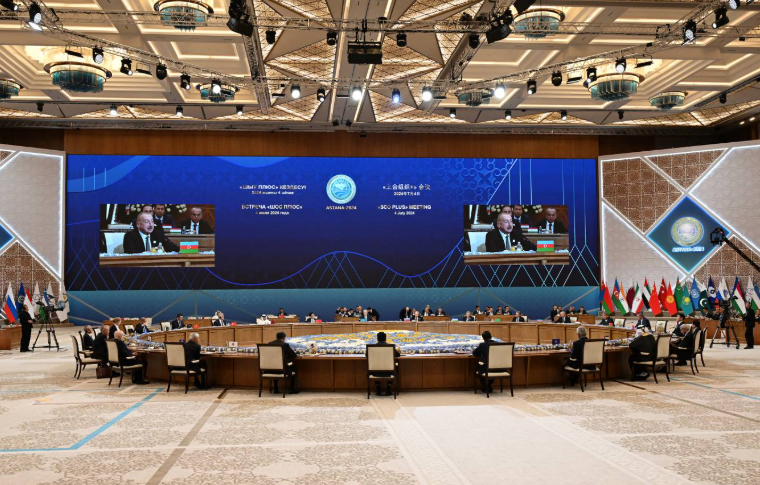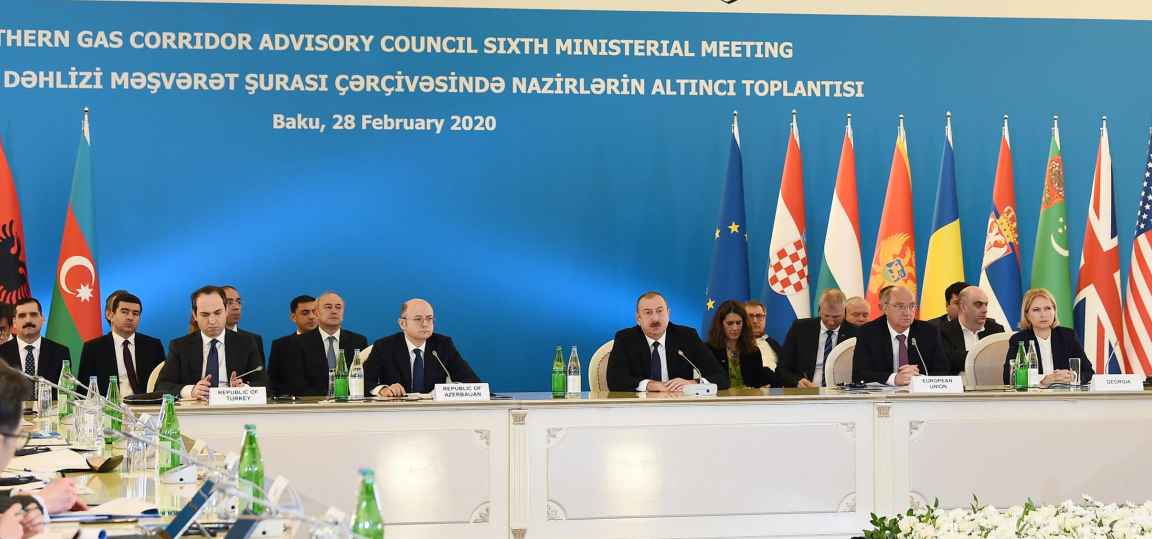Strengthening Azerbaijan's Regional and Global Role
Azerbaijan's strategic role in regional and global economic processes continues to strengthen, marked by significant developments during President Ilham Aliyev's recent visit to Astana. His participation in the Shanghai Cooperation Organization (SCO) Summit and the "SCO Plus" meeting, alongside bilateral and multilateral meetings with world leaders, showcased Azerbaijan’s growing influence and commitment to enhancing economic cooperation within the Turkic world. This visit set the stage for expanding trade routes, boosting investment opportunities, and reinforcing regional energy cooperation. The following explores key takeaways from this visit and highlights initiatives expected to shape the future of economic collaboration among Turkic states.

Azerbaijan’s Role in Regional Integration and Economic Growth
President Ilham Aliyev’s visit to Astana, alongside his active participation in the Shanghai Cooperation Organization (SCO) Summit and the "SCO Plus" meeting, solidified Azerbaijan’s role as a central player in shaping the future of regional and global economic dynamics. Azerbaijan’s growing influence is not only evidenced by its participation in these high-profile events but also by the nation's continued efforts to integrate itself deeper into multilateral economic frameworks, focusing on both infrastructure development and trade diversification.
Azerbaijan’s commitment to regional integration is reflected in its role as a pivotal intermediary between Europe and Asia. Over the past decade, Azerbaijan has worked to enhance its position as a key economic and logistical hub within the Eurasian landmass. This role is amplified by the country’s continued emphasis on improving connectivity across regional borders through the development of new transport and trade infrastructure. This approach is central to Azerbaijan's broader strategy to diversify its economy and become an essential player in global trade networks.
Azerbaijan’s forward-looking regional economic strategy has increasingly focused on attracting global investments and fostering deeper economic cooperation with neighboring countries. The country has worked actively to align its priorities with major international initiatives, like the Shanghai Cooperation Organization’s objectives of creating more efficient economic partnerships across Asia and Europe. Moreover, Azerbaijan’s strategic participation in the "SCO Plus" format emphasizes its commitment to enhancing economic cooperation among Turkic states, which has opened new pathways for increased investment flows and trade opportunities. As a result, Azerbaijan has cemented its role as an economic bridge, connecting regional players and facilitating greater integration in areas like technology, finance, and infrastructure.
By taking a proactive approach to fostering regional integration, Azerbaijan is actively contributing to the creation of a more diversified and resilient economic landscape in Eurasia. The country’s growing economic influence, supported by robust infrastructure and a diverse economic portfolio, places it in a strategic position to shape regional policy and drive significant economic growth. The country’s engagement in multilateral dialogues and its ability to foster cooperation among key stakeholders positions it as a linchpin for future economic prosperity in the Turkic world and beyond.
Expanding Trade Routes and Investment Opportunities
The "SCO Plus" format emphasized expanding trade routes and exploring mutual investment opportunities. Azerbaijan’s strategic position along the Middle Corridor was a key highlight, with growing international interest in leveraging this efficient transcontinental trade route that connects East Asia to Europe. The Middle Corridor is expected to reduce transportation time by 20-25% compared to traditional routes, significantly enhancing trade efficiency.
The Middle Corridor's growing importance in global trade flows has also attracted increased interest from international stakeholders. This transcontinental route is not only a commercial link between Europe and Asia but also a critical artery that improves access to regional and global markets. The Baku-Tbilisi-Kars railway has seen its throughput capacity increase to 5 million tons per year, and Alyat International Sea Trade Port has expanded its cargo handling capacity from 15 million tons to 25 million tons. These infrastructural upgrades are expected to further strengthen trade relations within the OTS, fostering greater economic ties with neighboring regions, especially the EU, the Middle East, and Central Asia.
A significant development during the visit was the signing of the "Joint Declaration on the Establishment of Strategic Partnership between Azerbaijan and China," which aims to further deepen economic, trade, transportation, logistics, tourism, agriculture, and other sectors of cooperation. Azerbaijan’s early support and participation in China’s "Belt and Road" initiative has facilitated significant investments in Central Asia. In 2023, over 40 billion dollars were invested as part of this initiative, further demonstrating Azerbaijan's pivotal role in regional connectivity and economic cooperation.
These agreements lay the foundation for an even greater trade volume between Azerbaijan and China. Trade turnover between the two countries reached 3.1 billion USD in 2023, and with the signing of new agreements, it is projected to grow substantially in the coming years, further enhancing regional economic integration and opening up new sectors for collaboration.
The meetings between Azerbaijan’s president and the leaders of Turkey and Kazakhstan emphasized a unified approach toward regional economic integration. Collectively, the Turkic states boast a GDP of over 2 trillion USD and a population of more than 150 million people, creating a substantial market for regional trade and investment. The OTS continues to play a pivotal role in fostering economic cooperation and managing key projects, such as the Middle Corridor, which stands at the forefront of their collaborative efforts.
Increased collaboration within the OTS is expected to drive regional trade by 20% over the next five years, potentially adding an additional 50 billion USD to the regional economy. These projections are grounded in the ongoing infrastructural developments and trade agreements signed at the SCO Plus meeting, reinforcing the commitment to mutual growth and economic stability across the region.
Energy Cooperation: Securing Regional Energy Infrastructure
Energy cooperation remains a critical component of the economic ties between the Turkic states. Azerbaijan plays a leading role in ensuring regional energy security due to its substantial oil and gas reserves, as well as its involvement in major energy projects like the Southern Gas Corridor, TANAP, and TAP pipelines.

These initiatives not only guarantee energy supply to Turkey and Europe but also contribute to broader geopolitical stability in the region.
The Astana discussions also focused on expanding energy infrastructure and diversifying energy supply routes. Azerbaijan’s energy projects are essential for enhancing connectivity and reducing dependency on traditional energy supply routes, ensuring long-term energy security for both Azerbaijan and its neighbors. The diversification of energy supply routes remains vital for maintaining the region’s stability, particularly in the context of fluctuating global energy markets and ongoing challenges related to energy security.
The Future of the OTS: Regional Cooperation and Growth
The OTS continues to serve as a critical platform for regional economic cooperation. As the OTS members— Azerbaijan, Hungary, Kazakhstan, Kyrgyzstan, Northern Cyprus Turkish Republic, Turkey, Turkmenistan, and Uzbekistan —continue to collaborate, they aim to accelerate regional development through joint ventures and shared projects. With enormous natural resources, young population and strategic location , the Turkic states form one of the most dynamic and growing economic regions in the world.
The OTS’s future efforts will focus on improving cross-border trade, investing in infrastructure projects, and pursuing sustainable energy solutions. The integration of these countries into global trade networks, supported by projects like the Middle Corridor, will boost economic growth and foster long-term partnerships in key sectors such as energy, transportation, and technology. The next five years are expected to be a period of strong economic collaboration, with growth projections for trade and investment showing significant upward trends.
The Path Forward for Economic Cooperation
Azerbaijan's engagement in the Shanghai Cooperation Organization and the "SCO Plus" meeting has highlighted the country’s central role in driving regional and global economic integration. Through strategic partnerships, improved trade routes, and collaborative energy projects, Azerbaijan is well-positioned to continue its leadership in regional economic cooperation. With the expansion of the Middle Corridor and strengthened ties with China, Turkey, and Kazakhstan, Azerbaijan is paving the way for a more interconnected, prosperous future for the Turkic states.





Most readed news
"Azexport" portal held a meeting at AzTU on "International e-commerce platforms…
A discussion was held on the monitoring of the State Program on the Geological Study of the…
Azerbaijan-Iran relations: from the past to the future
The awarding ceremony of the winners of the "GIS-Tech Marathon 2025" took place…
The first meeting on simplifying air transportation formalities was held at CAERC
Employees of the "Enterprise Azerbaijan" portal met with a professor from Stanford…
Call for co-authors “Turkic States: Rising Investment Powerhouses” Book
An info session was held at Baku State University as part of the "Startup School 3"…
Azerbaijan-China Relations: Formation and Perspectives
CAERC has been awarded at the United Kingdom's "Global Brand Awards 2025" international…